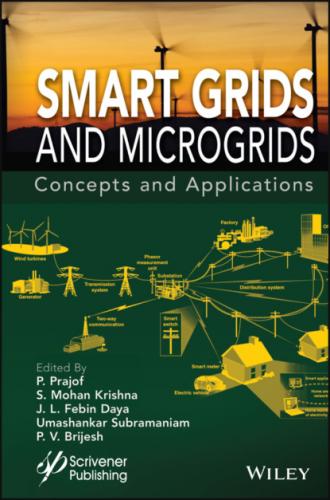To show that the controller would work for the case when the battery converter system is in islanded mode, i.e., Modecommand = 0 is received from the EMS, the battery converter system is made to maintain the PCC voltage. Initially, the system was operated in grid-connected mode and was supplying 10k W of real power to the grid. At t=1 sec, the grid was disconnected and reference voltage to be maintained at PCC is given to the controller. At 1.5 sec, the battery converter system is again connected back to the grid. Figure 2.10 shows the result for this case. From the waveforms, it is clear that the converter was able to maintain the PCC voltage even for the case when the grid was disconnected and again connected back to the grid.
Figure 2.9 Performance of the controller when the battery converter system is in grid connected mode.
Figure 2.10 Waveform of PCC voltage, real and reactive power exchanged fed for the condition when the battery converter system switches between grid-connected mode and islanded mode.
2.6 Conclusion
With the high demand for integration and implementation of renewable energy sources (RES) to the microgrid due to climate change policies, the requirement of ESS and its control is expanding. Hence, the need and availability of ESS and its category is briefly explained with the assessment. Moreover, power converters play an incredibly significant role in the integration of RES and ESS to the microgrid. The categories, needs and applications of power electronics converters were also presented. To discuss the control and design of battery integrated dc and ac microgrid system, the MATLAB-Simulink model is developed. Different case studies prove the fact that the controller can perform satisfactorily.
References
1. Rahimi, A., Zarghami, M., Vaziri, M., Vadhva, S. (2013, September). “A simple and effective approach for peak load shaving using Battery Storage Systems”. In 2013 North American Power Symposium (NAPS) (pp. 1–5). IEEE.
2. Bocklisch, T. (2015). “Hybrid energy storage systems for renewable energy applications”. Energy Procedia, 73, 103–111.
3. Hannan, M. A., Hoque, M. M., Mohamed, A., Ayob, A. (2017). “Review of energy storage systems for electric vehicle applications: Issues and challenges”. Renewable and Sustainable Energy Reviews, 69, 771–789.
4. Wroblewska M. (2011). “Emergency generators 10 second starting”. In ePOWER NEWS.
5. Fathima, A. H., Palanisamy, K. (2016). “Energy storage systems for energy management of renewables,” in Distributed Generation Systems.
6. H., Cong, T. N., Yang, W., Tan, C., Li, Y., Ding, Y. (2009). “Progress in electrical energy storage system: A critical review”. Progress in Natural Science, 19(3), 291–312.
7. H., Cong, T. N., Yang, W., Tan, C., Li, Y., Ding, Y. (2009). “Progress in electrical energy storage system: A critical review”. Progress in Natural Science, 19(3), 291–312.
8. Kascak, P. E., Kenny, B. H., Dever, T. P., Santiago, W., Jansen, R. H. (2001, July). “International space station bus regulation with NASA Glenn research center flywheel energy storage system development unit”. In Intersociety Energy Conversion Engineering Conference (Vol. 1, pp. 269–274). SAE; 1999.
9. Malhotra, A., Battke, B., Beuse, M., Stephan, A., Schmidt, T. (2016). “Use cases for stationary battery technologies: A review of the literature and existing projects”. Renewable and Sustainable Energy Reviews, 56, 705–721.
10. Umanand, L. (2009). “Power Electronics: Essentials and Applications”. Wiley India Pvt. Limited.
11. Gil, G. V., Catata, E. H., Ccarita, J. C., Cardoso, J. G., Sguarezi Filho, A. J., Azcue-Puma, J. L. (2016, November). “Digital controller design for interleaved boost converter in photovoltaic system”. In 2016 12th IEEE International Conference on Industry Applications (INDUSCON) (pp. 1–8). IEEE.
12. Hasaneen, B. M., Mohammed, A. A. E. (2008, March). “Design and simulation of DC/DC boost converter”. In 2008 12th International Middle-East Power System Conference (pp. 335–340). IEEE.
13. Mohan, N., Undeland, T. M., Robbins, W. P. (2003). “Power electronics: converters, applications, and design”. John wiley sons.
14. Iravani, R. (2010). “Voltage-Sourced Converters in Power Systems: Modeling, Control, and Applications”. Wiley-Blackwell.
15. Gao, David Wenzhong. “Energy storage for sustainable microgrid”. Academic Press, 2015.
16. Reznik, A., Simões, M. G., Al-Durra, A., Muyeen, S. M. (2013). “LCL filter design and performance analysis for grid-interconnected systems”. IEEE transactions on industry applications, 50(2), 1225–1232.
17. Lamchich, M. R. T. (2004). “Average Current Mode Control of a Voltage Source Inverter Connected to the Grid, Application to Different Filter Cells”. Journal of Electrical Engineering, 55(3–4), 77–82.
*Corresponding author: [email protected]
Конец ознакомительного фрагмента.
Текст предоставлен ООО «ЛитРес».
Прочитайте эту книгу целиком, купив полную легальную версию на ЛитРес.
Безопасно оплатить книгу можно банковской картой Visa, MasterCard, Maestro, со счета мобильного телефона, с платежного терминала, в салоне МТС или Связной, через PayPal, WebMoney, Яндекс.Деньги, QIWI Кошелек, бонусными картами или другим удобным Вам способом.
